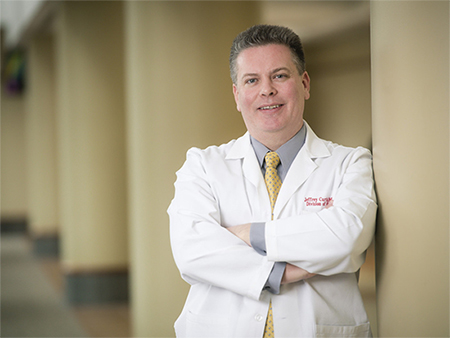Media contact: Savannah Koplon
 Jeffrey Curtis, M.D.The need for virtual health care options has significantly increased because of the COVID-19 pandemic. UAB researchers and collaborators have received a two-year, $400,000 grant from the American College of Rheumatology’s Rheumatology Research Foundation to support telehealth-delivered health care.
Jeffrey Curtis, M.D.The need for virtual health care options has significantly increased because of the COVID-19 pandemic. UAB researchers and collaborators have received a two-year, $400,000 grant from the American College of Rheumatology’s Rheumatology Research Foundation to support telehealth-delivered health care.
Jeffrey Curtis, M.D., professor of medicine in the Division of Clinical Immunology and Rheumatology at the University of Alabama at Birmingham, will use this grant to support the project Telehealth-delivered Healthcare to Improve Care — THRIVE in community-practice rheumatology. The project’s collaborators include Cedars-Sinai Medical Center, CreakyJoints®, a digital arthritis community for patients and caregivers worldwide, and its ArthritisPower® research registry. The THRIVE project’s primary investigator, Swamy Venuturupalli, M.D., is the recipient of this year’s ACR’s Norman B. Gaylis, M.D., Clinical Research Award, and is slated to begin in January of 2021.
“This grant is an exciting opportunity to identify and build best-in-class approaches to telehealth and to test specific strategies to assess patients with inflammatory arthritis, particularly rheumatoid arthritis,” Curtis said. “Clinical trials and routine patient care have been severely hampered by COVID-19-related perturbations in care delivery. We will scope and validate methods for disease activity assessment using telehealth-related technology, coupled with remote patient monitoring capabilities, including digitally captured, patient-reported outcome data.”
The THRIVE project seeks to define, solidify and incorporate the best practices in telehealth rheumatology, disseminating these tools to community rheumatologists everywhere through a variety of channels.
The ultimate goal of this project is to increase patient access to care, expand the impact of rheumatology — especially for those marginalized or most at risk by the COVID-19 pandemic — and enable and improve the value of care provided by rheumatology providers in community settings through telehealth.
“We are excited about the partnership between academia, community practitioners and arthritis patient communities, in what we expect to be a model paradigm for collaborative, practice-based research now and into the future,” Curtis said.